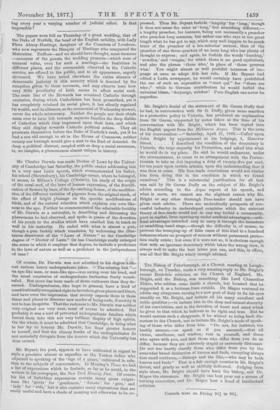The papers were full on Thursday of a great wedding,
that of the Duke of Norfolk, the head of the English nobility, with Lady Flora Abney-Hastings, daughter of the Countess of Loudoun, who now represents the Marquis of Hastings who conquered the Mahrattas. Endless—and we should have thought, most tiresome —accounts of the guests, the wedding presents—which were of unusual value, even for such a marriage—the festivities in 'different places, and the ceremonials observed in the Catholic 'service, are offered to the public, and to all appearance, eagerly -devoured. We have noted elsewhere the entire absence of 'democratic jealousy in this country which is denoted by the reception given to these accounts, and may observe here how very little peculiarity of faith seems to affect social rank. 'The main line of the Howards has remained Catholic through centuries, during which Catholicism has been proscribed, yet it has completely retained its social place, it has silently regained its wealth, and its alliances, as the ceremonial of Wednesday showed, cover the whole aristocracy. Neither the people nor their chiefs seem ever to have felt towards separate families the deep dislike of Catholics which they impressed upon their laws, and which they still display towards Catholic political action. They all prostrate themselves before the Duke of Norfolk's rank, yet if he had a son old enough to sit in the House of Commons, neither county nor borough would give a seat to the Earl of Arundel. So -deep a political distrust, coupled with so deep a social reverence, is, we imagine, a phenomenon almost unique in history.






































 Previous page
Previous page